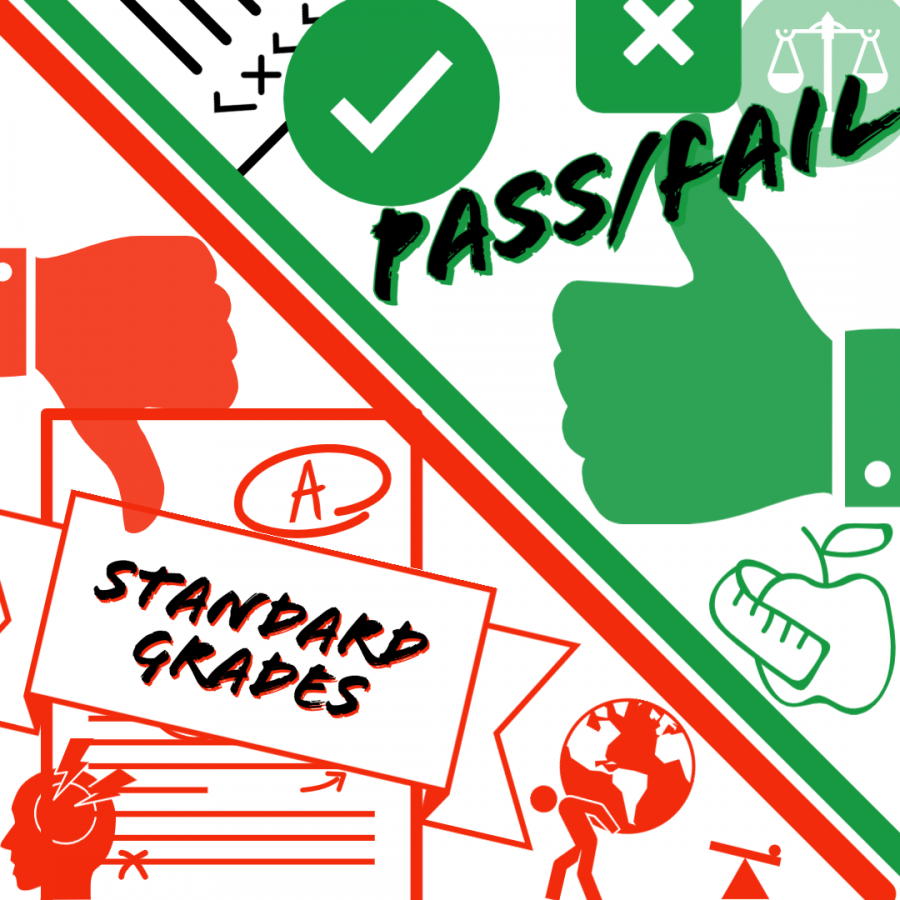Second semester should be pass/fail to relieve student stress during coronavirus pandemic
Graphic weighing the positive and negative aspects of implementing a second semester pass/fail grading system.
March 23, 2020
With remote learning replacing classroom teaching during the coronavirus pandemic, teachers and students are attempting to navigate their way through new online learning platforms such as Zoom and Google Meet. During this unprecedented and chaotic time, students cannot just be expected to go along with business as usual and maintain their previous levels of academic performance; The Masters School Administration should implement a pass/fail grading system for the second semester to make up for the countless obstacles students and faculty will now experience in the face of COVID-19.
Especially at Masters, a school where students can thrive around the Harkness table and classes are centered around student-led discussions, these new online teaching methods will undoubtedly impact classroom dynamics.
In the chaos of an international health crisis, it is unfair to subject students to a standard grading system, as grades and test scores could drop. Students are going through huge transitions because of the pandemic, and producing high grades is not everyone’s priority right now.
To expect students to focus on learning and return to their prior academic performance would be ignoring the many barriers students are now facing.
It is difficult for students to focus on learning material and maintaining a grade point average when their whole world is shifting and the health of their loved ones is uncertain.
Every student has different living circumstances – not everyone has a quiet environment to learn in, or has wifi at home. With daycare and schools closed, older siblings might be expected to babysit younger siblings if parents still have to go to work because their parents are “essential workers.”
It is also necessary to consider students with learning differences: they are suddenly expected to do a much greater proportion of independently-directed work. The online classes pose a disadvantage to kinesthetic learners, who struggle grasping information with lectures, presentations and demonstrations.
International students are at a particular disadvantage; they might not be able to go to class or ‘office hours’ because of drastic time differences. For students in China, for example, a 2 p.m. class in New York begins at 2 a.m. in Shanghai, China.
If the Masters administration were to enforce a pass/fail grading system for the second semester of the year, it would allow students to learn content without stressing about maintaining their GPA and getting stellar grades. Changing second semester to pass/fail will give students the ability to further focus on their mental health and adapt to this new learning environment with ease.
Furthermore, teachers are still learning and adjusting to online teaching; students, parents and administrators cannot expect teachers to be fluent in an entirely different way of teaching from one day to the next. For faculty to have to calculate grades based on this new style of learning would be difficult and unfamiliar. Head of School Laura Danforth acknowledged this in her emails sent out to the Masters community.
This approach has begun to be adopted by high schools and colleges including Scarsdale High School and Ardsley High School. The Massachusetts Institute of Technology was one of the first schools to make the switch to pass/fail, and was soon followed by other institutions including Northwestern University, Middlebury College, University of Pennsylvania, Duke University and Smith College. Some schools have made pass/fail a requirement for all students, while others are giving the students the option to decide which grading method they would prefer. More and more colleges seem to be re-evaluating their grading, and Masters’ administration should be as well.
However, it is important to recognize that if pass/fail were implemented, some students may be less inclined to work hard and could slack off for the rest of the semester. It is my belief that students who do not put in the effort will suffer long term, with their shortcomings represented in final exams and AP test scores.
Some might also argue that if they had an “A” up to that point in the semester, going to a pass/fail grading system would make all of their effort and hard work insignificant and not matter.However, in my opinion, if students have worked hard for the first half of the semester, the skills and growth they developed from the third quarter will allow them to get more out of the fourth quarter, whether or not there even are cumulative exams. Students should want to deepen their body of knowledge in a particular subject area without needing to receive an extrinsic/external reward for that effort.
Nevertheless, this grading system would be widely beneficial to the mental health and wellbeing of students, teachers, administrators and parents. Although it is far from ideal, sometimes sacrifices should be made in difficult times, and I, for one, think this should be one of them.





Paul West • Mar 26, 2020 at 11:17 PM
Sophie, you offer a lot of good reasons for moving to pass/fail. Frankly, I like the way that system lets students with genuine motivation show it by continuing to do quality work in the absence of a grade scale.